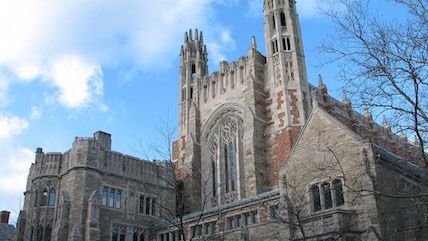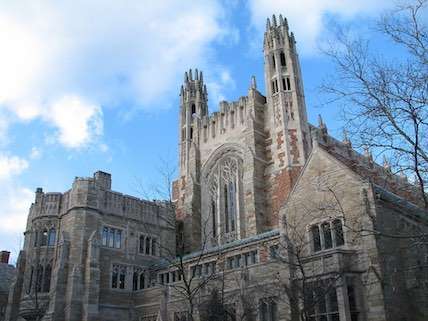No Campus for Young Conservatives: Yale and the Case Against Safe Spaces
Who's the most marginalized identity group of all?


The overwhelming majority of self-identified conservative students at Yale University think the campus is an unwelcome place for them: 95 percent according to a recent survey. And other students agree: 75 percent of the 2,000 students surveyed thought Yale was specifically hostile toward conservatives.
Will this news motivate any campus authority figure, student-government working group, or activist student movement to demand a safe space for conservative students? I thought not.
If anything, the opposite occurred. Consider Yale College Dean Jonathan Holloway's response to the survey. According to The Yale Daily News:
In an interview with the News, Yale College Dean Jonathan Holloway said the results of the survey were lamentable but unsurprising. Holloway attributed conservative students' discomfort at sharing their views partly to the pervasiveness of social media.
"So much of your generation's world is managed through smart phones. There's no margin anymore for saying something stupid," Holloway said. "People have been saying dumb things forever, but when I was your age word of mouth would take a while. Now it's instantaneous, now context is stripped away."
Attempting to explain the campus's contempt for conservative students, Holloway further insulted them. Of course conservatives aren't welcome—we don't welcome stupid people! he seems to be saying.
Holloway later attempted to revise his comment. "In no way did I intend to imply that the views of any student or faculty were stupid or should be dismissed," he clarified to The Yale Daily News.
Not everyone finds this clarification persuasive. Minding the Campus quoted a Yale graduate as saying, "He called after the article appeared to have them add a note saying he wasn't trying to suggest that conservatives are stupider than liberals — but of course that's the only way the quote makes any sense. It was a classic Kinseyan gaffe: he accidentally said what he really thought."
So we have a Yale administrator perceived as indifferent (perhaps unfairly) to a certain segment of students who feel disrespected, uncomfortable, and marginalized on campus. What should these students do about it? Should they surround Holloway and berate him for failing in his duty to provide an emotional and intellectual safe space for them?
You can probably guess where I'm going with this, because an analogous episode has occurred on campus after campus—most notably at Yale last fall. The only difference is that the victimized group was liberal students of color, rather than conservatives. Silliman College Master Nicholas Christakis and his wife Erika were nearly run off campus because they were perceived as insensitive toward students' demands for formal policies discouraging offensive Halloween costumes.
An objective third-person observer might well conclude that conservative students at Yale are probably more marginalized than many other kinds of students. Their professors are almost unanimously composed of scholars who disagree with them. Their dormitories are run by residential advisers trained to militantly enforce a far-left version of political correctness (no Harambe jokes, or Trump2016 signs). They're viewed with curiosity, if not outright hostility.
Of course, no one's views should be exempt from scrutiny on a college campus—that's the whole point of being there. So it doesn't really bother me that conservatives feel uncomfortable. Occasionally feeling uncomfortable is the price—the benefit, even—of getting a quality education. That's why the concept of an intellectual safe space is so reprehensible: students shouldn't feel "safe" from ideas with which they disagree. On the contrary, they should feel constantly threatened by them.
But if the idea of protecting conservative students' precious feelings strikes you as ridiculous, shielding delicate liberals from offensive Halloween costumes should as well. It's the same thing.
What's different is how various student factions have responded to their perceived marginalization. Liberals have waged a veritable war on Halloween across college campuses, and acquiescent administrators have given them everything they wanted and more: posters discouraging cultural appropriation, lists of prohibited costumes, and even formal promises that inappropriate behavior will be investigated. The left has also demanded—and received—identity-specific safe spaces for its various constituencies: students of color, LGBTQ students, etc.
For the most part, conservatives have not engaged in the same level of we-are-offended demand-making. But there are examples. When a liberal law professor at Georgetown University chose Supreme Court Justice Antonin Scalia's death as an ideal moment to disparage the man's record of "intolerance," two conservative professors reported that right-leaning students were "traumatized, hurt, shaken, and angry," by the criticisms of their legal hero.
Again, my response would be: too bad for them. Maybe conservative students could benefit from hearing some criticism of Scalia. Isn't that what college is for?
But the left has made this an untenable position. If feelings matter, then everyone's feelings must matter equally. If a campus is going to prohibit offensive Halloween costumes, what's to stop it from prohibiting offensive statements about Scalia?
In truth, it's a surprise that conservative students aren't making better use of their status as one of the most marginalized groups on campus. Wherever and whenever they leverage their hurt-feelings in order to shut down speech they don't like on campus, I'll denounce it. But I'll also remain disappointed with the left for opening this door in the first place.


Show Comments (69)